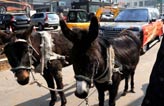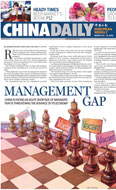America
Controversy remains after Obama's defending on Libya actions
Updated: 2011-03-29 15:30
(Xinhua)
WASHINGTON -- Though US President Barack Obama took 27 miniutes on Monday to strongly defend his policy on military action in Libya, many still believe the policy remains murky.
Facing mounting domestic and international criticism for his ambiguous policy, Obama aimed to clarify his position amid voices doubting how the military intervention will end at this stage.
Critics, however, fault Obama for not providing an outline of what comes next despite its swift transfer of command to NATO.
Worrying the United States would be entangled into another prolonged war similar to the one in Iraq, Obama declared NATO would formally take over full command of the military operations in Libya starting from Wednesday.
Transferring command to NATO, as Obama put it, will "significantly reduce" the risk and cost to US military and taxpayers.
"The United States does not want to be seen as leading another war in the Middle East and does not want to be at the forefront of what will undoubtedly be a very difficult transition in Libya, even if Gaddafi is removed," said Marina Ottaway, Middle East expert with the Washington-based Carnegie Endowment for International Peace.
"Also, there is a sense in Washington that the North African countries are more important to Europe than to the United States, so Europe should play the major role," she told Xinhua.
Obama said the burden of action should not be "America's alone" and allies and partners should "bear their share of the burden and pay their share of the costs."
Some believe that Obama's speech failed to clear up the controversies.
CNN host Eliot Spitzer said the speech has not successfully explained the confusion of the administration's policy on Libya.
Richard Myers, former US chairman of Joint Chiefs of Staff, also doubted that the United States can really keep a limited role, as US involvement in the past often "escalated."
Citing the example of Iraq, Myers said eight years after Saddam Hussein was forced out of power, the government largely formed by opposition is still weak and US forces are still there.
"US leaders don't seem to know much about the political dynamics in Libya or how the situation will likely turn out," Ted Carpenter, expert with the Cato Institute, told Xinhua.
"Perhaps most surprisingly -- and something that is very worrisome -- policy makers know little about the rebels the coalition is supporting, the tribal divisions in Libya, the possible geographic split between eastern and western Libya, and the extent of Islamist strength in that country. Any one of those factors could prove to be a big problem," he added.
E-paper

Rise and shine
The Chinese solar energy industry is heating up following recent setbacks in the nuclear sector
Preview of the coming issue
Bombs aim for regime change
CSI, with a twist
Specials

Donkey-powered Land Rover
Two donkeys pull a broken-down Land Rover in Shenyang, Liaoning province.

China Fashion Week
Models present creations for the Hosa Swimwear Trend Press Conference 2011.

Peony express
Growers of china's unofficial national flower are reaching out to europe for help




